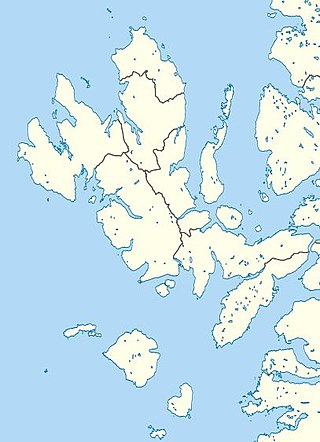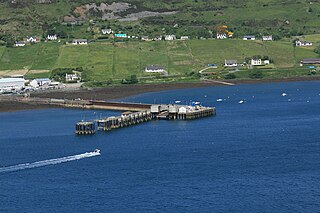
Highland is a council area in the Scottish Highlands and is the largest local government area in the United Kingdom. It was the 7th most populous council area in Scotland at the 2011 census. It has land borders with the council areas of Aberdeenshire, Argyll and Bute, Moray and Perth and Kinross. The wider upland area of the Scottish Highlands after which the council area is named extends beyond the Highland council area into all the neighbouring council areas plus Angus and Stirling.

Ullapool is a village and port located in the civil parish of Lochbroom in the county of Ross and Cromarty, Scottish Highlands. It is located around 45 miles northwest of Inverness. According to the Scottish Government in 2016, the village had a population of 1,520 people, making it the largest settlement in Wester Ross.

Dingwall is a town and a royal burgh in the Highland council area of Scotland. It has a population of 5,491. It was an east-coast harbour that now lies inland.

Ross and Cromarty, is an area in the Highlands and Islands of Scotland. In modern usage, it is a registration county and a lieutenancy area. Between 1889 and 1975 it was a county.

Sleat is a peninsula and civil parish on the island of Skye in the Highland council area of Scotland, known as "the garden of Skye". It is the home of the clan MacDonald of Sleat. The name comes from the Scottish Gaelic Slèite, which in turn comes from Old Norse sléttr, which well describes Sleat when considered in the surrounding context of the mainland, Skye and Rùm mountains that dominate the horizon all about Sleat.

Skye and Lochalsh was a local government district, created in 1975 as one of eight districts within the Highland region in Scotland. It include the Isle of Skye and the Lochalsh area on the mainland. The main offices of the council were in Portree, on the Isle of Skye. The district was abolished in 1996 when Highland was made a single-tier council area.

Kyle of Lochalsh is a village in the historic county of Ross & Cromarty on the northwest coast of Scotland, located around 55 miles (90 km) west-southwest of Inverness. It is located on the Lochalsh peninsula, at the entrance to Loch Alsh, opposite the village of Kyleakin on the Isle of Skye. A ferry used to connect the two villages until it was replaced by the Skye Bridge, about a mile (2 km) to the west, in 1995.
Angus Og is a comic strip created by Scottish cartoonist Ewen Bain. It ran from 1960 to December 1989, first in the Glasgow Bulletin and then in the Daily Record and The Sunday Mail.

Kyleakin is a village situated on the east coast of the Isle of Skye in the Inner Hebrides, Scotland. The village is along the strait of Kyle Akin, opposite the northwest Scottish mainland town of Kyle of Lochalsh. Kyleakin is within the parish of Strath, also known as Strath Swordale.
Skye Camanachd is a shinty team from the Isle of Skye, Highland, Scotland. It plays in the Premier Division and has a reserve team in North Division One, as well as a Ladies team in the WCA National Division One and a Ladies reserve team in the WCA Development League. The club is based at Pairc nan Laoch, Portree.

Uig is a village at the head of Uig Bay on the west coast of the Trotternish peninsula on the Isle of Skye, Scotland. In 2011 it had a population of 423.

Portree High School is a state co-educational comprehensive school in Portree, Isle of Skye in Scotland. As of 2020, the school enrols 494 pupils and employs 80 teachers and support staff. The school's catchment area draws from 15 primary schools across Skye and neighbouring Raasay. The school also has a hostel with boarding provisions for a small number of pupils who live in more remote areas of the island.

Oban is a resort town within the Argyll and Bute council area of Scotland. Despite its small size, it is the largest town between Helensburgh and Fort William. During the tourist season, the town can have a temporary population of up to over 24,000 people. Oban occupies a setting in the Firth of Lorn. The bay forms a near perfect horseshoe, protected by the island of Kerrera; and beyond Kerrera, the Isle of Mull. To the north are the long low island of Lismore and the mountains of Morvern and Ardgour.

Loch Alsh is a sea inlet between the isle of Skye in the Inner Hebrides and the Northwest Highlands of Scotland. The name is also used to describe the surrounding country and the feudal holdings around the loch. The area is rich in history, and is increasingly popular with tourists.

The Isle of Skye, or simply Skye, is the largest and northernmost of the major islands in the Inner Hebrides of Scotland. The island's peninsulas radiate from a mountainous hub dominated by the Cuillin, the rocky slopes of which provide some of the most dramatic mountain scenery in the country. Although Sgitheanach has been suggested to describe a winged shape, no definitive agreement exists as to the name's origin.

Inverness-shire or the County of Inverness, is a historic county in Scotland. It is named after Inverness, its largest settlement, which was also the county town. Covering much of the Highlands and some of the Hebrides, it is Scotland's largest county by land area. It is generally rural and sparsely populated, containing only three towns which held burgh status, being Inverness, Fort William and Kingussie. The county is crossed by the Great Glen, which contains Loch Ness and separates the Grampian Mountains to the south-east from the Northwest Highlands. The county also includes Ben Nevis, the highest mountain in both Scotland and the United Kingdom.

Radio Skye is a local radio station which broadcasts from Portree to the Isle of Skye, as well as the region of Lochalsh, Wester Ross on the Scottish mainland.

Pairc nan Laoch is a shinty stadium in Portree, Isle of Skye, Scotland. It is home to Skye Camanachd.

Lochalsh is a district of mainland Scotland that is currently part of the Highland council area. The Lochalsh district covers all of the mainland either side of Loch Alsh - and of Loch Duich - between Loch Carron and Loch Hourn, ie. from Stromeferry in the north on Loch Carron down to Corran on Loch Hourn and as (south-)west as Kintail. It was sometimes more narrowly defined as just being the hilly peninsula that lies between Loch Carron and Loch Alsh. The main settlement is Kyle of Lochalsh, located at the entrance to Loch Alsh, opposite the village of Kyleakin on the adjacent island of Skye. A ferry used to connect the two settlements but was replaced by the Skye Bridge in 1995.
Bun-sgoil Ghàidhlig Phort Righ is a Gaelic-medium primary school in Portree on Skye, Scotland. The school opened April 2018, becoming the third purpose-built Gaelic school in the Highland Council area. The £8.7 million building was built by Robertson Construction.




















